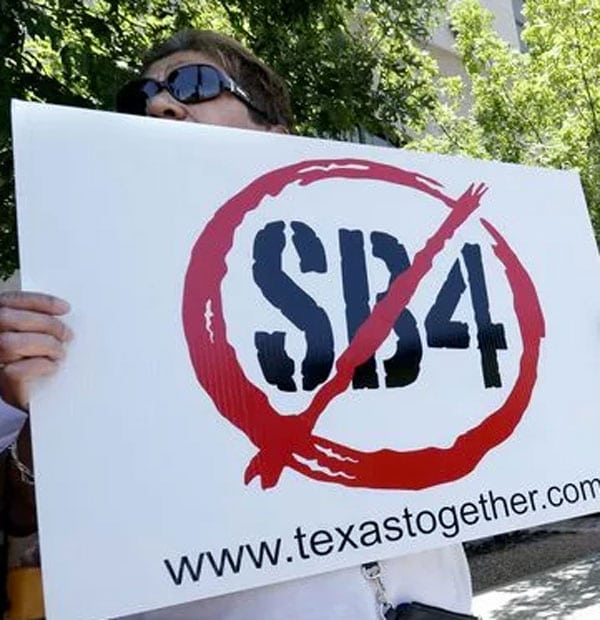
July 10, 2018; Next City
When the Texas legislature passed SB4, effectively outlawing sanctuary cities in the state, Austin did not give in. Instead, advocacy groups banded together and passed two resolutions that make Austin a “freedom city,” one that not only refuses to target immigrants but actively protects them from harmful policies and deportation.
Resolution 73 calls for the elimination of “discretionary arrests,” or arrests made in cases when a citation could be issued instead, such as marijuana possession. Resolution 74 ensures that immigrants are aware of their rights when being questioned by the police. It reads,
WHEREAS, the City of Austin strives to be an inclusive community for all people, especially those who are marginalized or oppressed…[the council ensures that] all people who are questioned about their immigration status or country of origin are well-informed, before answering such questions, that they have a constitutional right to remain silent and to refrain from answering such inquiries without retaliation.
United We Dream and two Austin-based advocacy nonprofits—Workers Defense Project and Grassroots Leadership—have been organizing on this issue since 2016. In May of 2017, they led a protest against SB4, known as the “show me your papers” law, which allows police to check the immigration status of anyone they arrest. Montserrat Garibay, Vice President of Certified Employees at Education Austin, said, “Our communities are building bridges and are working together more than ever because we know that by working together, we are stronger.”
The advocacy groups teamed with city councilman Gregorio Casar to author the resolutions, which passed unanimously. Casar told Next City’s Alejandra Molina, “this approach is an intersectional one that blends the concerns of organizers advocating for immigrant rights and Black Lives Matter.”
The ACLU has said it supports advocacy for freedom cities. Sarah Johnson, director for Local Progress, said, “There is an interest from all of our members in Texas and in other states across the country in really pursuing the strongest possible policies to protect immigrants at this time.”
Sign up for our free newsletters
Subscribe to NPQ's newsletters to have our top stories delivered directly to your inbox.
By signing up, you agree to our privacy policy and terms of use, and to receive messages from NPQ and our partners.
This kind of approach represents an important step, from a refusal to cooperate in persecution to active inclusion and protection of undocumented community members. Rebecca Sanchez, a representative of Grassroots Leadership, said, “We’re committed to fighting for a city where we redefine safety for ourselves and not through badges.” The directives given to the police by the city council indicate whether safety means protection for undocumented residents, or, as the Trump administration would have it, offer “protection” from undocumented immigrants and people of color for white residents unwilling to share space or recognize an inclusive national identity.
Nelson Linder, president of the Austin chapter of the NAACP, was more hesitant about Austin’s new direction. “We appreciate the gesture and the idea,” Linder told the Los Angeles Times’ Jaweed Kaleem. “This city has a history of symbolic overtures, but has been inconsistent in providing the kind of leadership that will implement its own resolutions. While the vote has been applauded, the Austin NAACP will continue to work toward more meaningful and substantial changes.”
Ken Casady, the Austin Police Association president, expressed a different kind of skepticism. He thought that the data showing disproportionate arrests of Black and Latinx residents was “misleading,” and said, “We will not tolerate being called racists…To us, this is a symbolic move.” However, the evidence of systemic racial injustice is omnipresent and overwhelming in police departments, even those that have made overt commitments to combating injustice and bias. Policies are needed that explicitly protect those who have been historically victimized by police systems.
Casar disagreed with Casady’s classification of the resolutions as symbolic, saying he thought the new resolutions could prevent 1,000 arrests.
Even if the move does turn out to be mostly symbolic, it is a statement worth making. Having legal protections on the books for undocumented immigrants is sadly rare and sorely needed, above and beyond the fact that persecuting people for having been born on the “wrong” side of an arbitrary line is morally repugnant. Studies have shown undocumented immigrants live with a higher baseline level of anxiety, and it affects their health and mental status, as well as their children’s health. A study from the National Institutes of Health found, “Screening instruments used to measure depression also found that undocumented immigrants are at highest risk of depressive symptoms and are disproportionately impacted by PTSD, anxiety, and depression when compared to other documented immigrants and citizens.”
Austin’s advocacy groups understood this and helped move their city from tolerance to active protection of immigrants. Other cities in Texas have said they will consider following suit.—Erin Rubin













